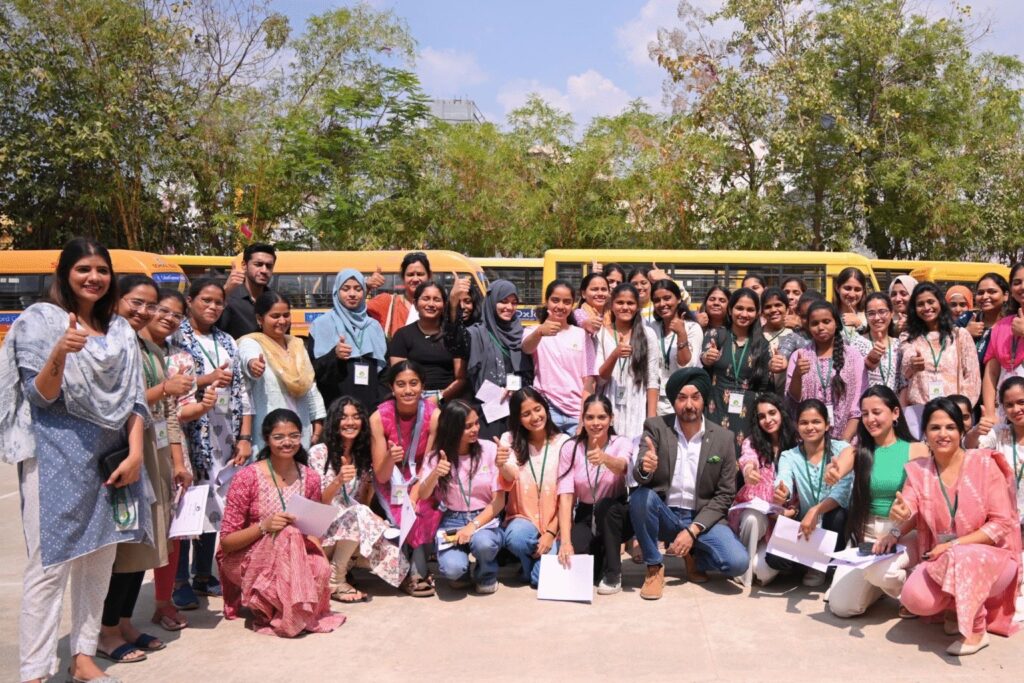In an exclusive chat with The Pioneer, Vibhuti Jain, founder of Touch a Life Foundation, opens up about her deeply personal journey—from losing her father and navigating financial hardship to building an organisation that now empowers hundreds of underprivileged girls across Hyderabad

Needhi Gattani
In the heart of Hyderabad, amidst fast-paced city life and towering ambitions, one woman’s deeply personal struggle sparked a powerful movement. Touch a Life Foundation, founded by Vibhuti Jain, began not with grand funding or government support, but with a simple desire: to prevent one girl from dropping out of college.
Vibhuti’s story began in 2014, when she moved to Hyderabad from a small town after losing her father. Coming from a Hindi-medium background and experiencing financial difficulties first-hand, she worked in the hotel industry to make ends meet. But even then, her heart was in visiting shelter homes and supporting underprivileged children.
“I was very shy to ask people for money. So, for my very first project, I started asking them to donate time and talent instead of money. That felt more honest and accessible for me.”
This community-driven spirit soon inspired her friend and now co-founder Rina Hindocha, a yoga instructor from a business background, to join the initiative. Together, they began shaping what would later become a city-wide movement for girls’ education.
The turning point came when Vibhuti’s domestic help’s daughter announced she was quitting college after her father’s death.
“That moment really hit me. I saw myself in her. She was dropping out not because of a lack of ability, but because of a lack of support. That’s when we launched the VIRIYA Scholarship Project. The word Viriya is Pali for ‘great effort’, and that’s exactly what we wanted to stand for—effort, not charity,” she says.
Unlike traditional aid programs, the VIRIYA Scholarship isn’t a one-time grant. It’s a promise to support each girl until she finishes her education and lands on her feet.
“We don’t just write a cheque and walk away,” says Vibhuti adding, “Our team follows through—from school enrollment to job placements. We’re in it with them, every step of the way.”

The process is rigorous and highly selective. Pamphlets are distributed across low-income areas, inviting girls and their parents to educational camps. As many as 300 girls attend each camp.
“Each girl goes through a detailed interview with our volunteer team,. We assess everything—academic performance, financial background, family situation. We even collect documents to ensure transparency. From there, we shortlist around 50 deserving girls.”
Annual fees—ranging from Rs 40,000 to Rs 1.5 lakh—are paid directly to colleges. “We never hand the money to beneficiaries. It’s important that the support goes exactly where it’s intended.”
She strongly believes that empowerment goes beyond books. The foundation has tied up with T-Hub, WE-Hub and several corporate partners to equip girls with professional skills and exposure.
“Many of these girls go to private colleges but lack basic career guidance,. We offer workshops on CV building, cybersecurity, interview prep, and even confidence training. Recently, 30 of our girls completed a leadership program at WE-Hub, and over 100 worked on internships with T-Hub. We’re not looking for the girl with the highest marks. We’re looking for ambition. For girls who dream of becoming something, but don’t know how to get there. We scout for those hidden gems who just need someone to believe in them.”
The foundation also connects students with professionals for one-on-one career counselling.

“There was one girl who wanted to pursue B.Com at a college charging Rs 80,000. Her family simply couldn’t afford it. We helped her find a reputable alternative within her budget and also covered the costs,” says Vibhuti.
Recognising the link between health, hygiene, and education, the foundation also distributes hygiene kits at every camp.
“Even if a girl isn’t selected for the scholarship, she leaves with something in hand and something in heart. Our kits contain basic essentials—sanitary pads, soaps, and more. And we always bring in inspiring women speakers to talk about real issues. These girls leave feeling seen, heard, and hopeful.”
One of the toughest challenges, she says, is convincing the parents—especially in communities where girls are married off right after school.
“We’ve been thrown out of homes, accused of being political agents, and called frauds. People couldn’t believe we wanted to help with no strings attached. We had to gain their trust, one home at a time.”
She recalls one such encounter: “A driver who had met with an accident told me he would have to withdraw his daughters from school. I promised I would pay both their fees. He didn’t believe me—thought it was a scam. But when we paid the fees in two days, the whole family was in tears.”
The early days were rough. Vibhuti remembers people mocking their social media posts and accusing them of showboating.
“We were doing it to build visibility and get support. But many assumed we were doing it for likes or fame. I ignored the noise. I knew we were doing it from the heart.”
With time, the foundation earned credibility—and today, boasts a board of esteemed mentors and advisors, including Srinivas Rao Mahankali (MSR), Kirthi Chintalapuri, Srividya Reddy, Sandeep Reddy, Brigadier Inder Sethi and Mr. Ankit Agarwal.
“I lost my father, but every time I support a girl who’s going through the same, I feel like I’m keeping his dream alive,” she says. “I’m not just educating them—I’m healing a part of myself.”



